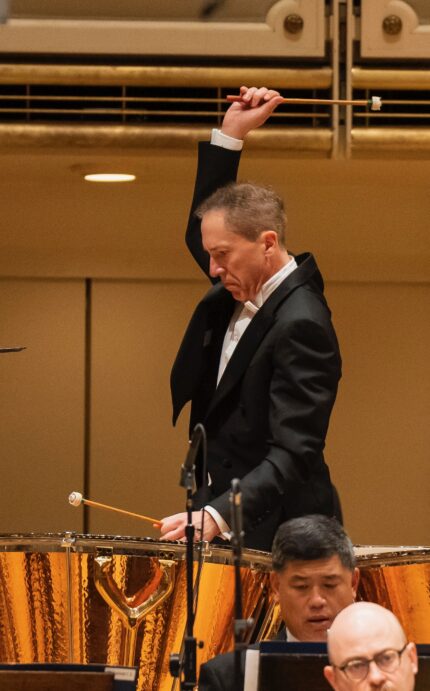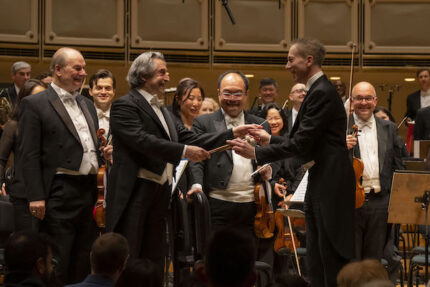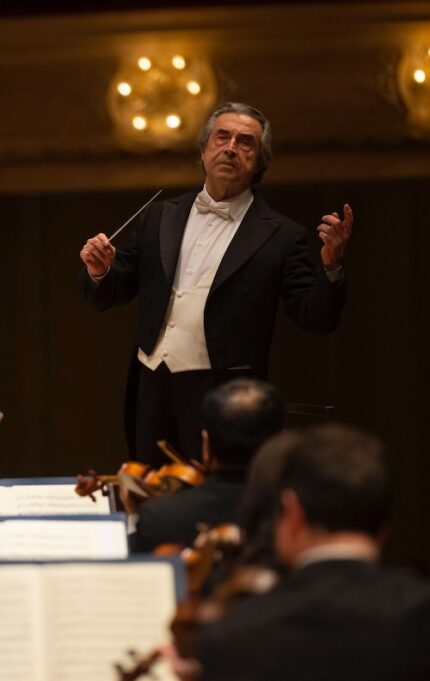A concerto for a rare instrument and a sonic spectacular from Muti and CSO

Is there a less likely solo instrument than the timpani? Yes, it can deliver imposing volume and bring an extra degree of excitement to orchestral climaxes. Yet how can an instrument limited to ranges of dynamic with precious little in varied colors or expression possibly make a convincing solo protagonist?
When the soloist is David Herbert, principal timpanist of the Chicago Symphony Orchestra, one can become a believer. With Riccardo Muti leading the CSO, Herbert had his belated spotlight debut Thursday night in William Kraft’s Timpani Concerto No. 1.
Since leaving the San Francisco Symphony a decade ago to join the CSO, Herbert has proven one of Muti’s finest hires. He can deliver remarkable power and volume when required (and minus any show-biz stage theatrics).
But even more impressive has been his subtlety, sensitive blending and restraint. There are timpanists that like to draw attention to themselves, swamping colleagues in climaxes and playing too loud when they should be soft. David Herbert always seems to be just right—a formidable sonic presence when required, but first a collegial member of the larger ensemble and a true musician.
Both his colleagues and the audience clearly recognize Herbert’s estimable musicianship and contributions to the CSO since 2013—the players applauded him vigorously and the audience gave him an extended, cheering ovation upon his entrance Thursday night.
William Kraft, who died last year at age 99, was a member of the Los Angeles Philharmonic for 26 years (1955-81)—first as percussionist and then timpanist for 18 seasons. After retiring as a player, he served as the orchestra’s composer in residence from 1981-85. Kraft’s First Timpani Concerto was written in 1983 and premiered the following year by Thomas Akins with the Indianapolis Symphony Orchestra conducted by John Nelson.
The Chicago-born composer doesn’t try to solve the inherent issues involved in writing a concerto for his rather monochromatic instrument. But Kraft works a kind of clever sleight of hand in this score: avoiding the expressive limitations of the kettledrums and concentrating on the things they can do—volume, fast drumming, dueling dialogues with the orchestra. Snappily scored for a huge ensemble—including piano, celeste and massive percussion battery—Kraft’s jazzy, engaging concerto is as much a brilliant showpiece for orchestra as it is for the soloist.
From the quiet hand-drumming cadenza that opens the Allegretto first movement, Herbert was a superbly assured soloist in this belated CSO premiere. The angular main theme passes to solo cello and then English horn, and eventually the full orchestra. A dark, restless tension dominates the movement with the increasingly virtuosic solo part alternating with hard-charging symphonic writing, as piquant passages for high percussion provide contrast.
The middle movement was written following the death of Kraft’s mother. Centered on glissandi, first in the strings and then the timpani, there is a touching elegiac quality in this music. The soloist plays a rolling figure at one point, and Herbert made it sound uncannily as if it were coming from a distance; the mysterious music slowly fades away to silence.
The solo timpani cuts loose in the final movement (“Fleeting”), though the brassy orchestra announces the four-note motif. At one point, Herbert plays what sounds like a “prepared” timpani with a striking tinny sound for contrast. The percussion music returns and the music builds in drive and intensity, culminating in a fiery, 70s-rock-break cadenza by Herbert before an emphatic coda.
Like Benjamin Britten’s operas, Kraft’s Timpani Concerto No. 1 is one of those works that make a much stronger impression in live performance than listening to a recording. That’s especially true with a superbly equipped soloist like Herbert who provided first-class advocacy throughout. Even with one of the most extended and enthusiastic ovations of the season for a soloist, this is one concerto performance that was, unsurprisingly, not followed by an encore.
As he so often does in contemporary scores, Muti served up a kaleidoscopic and brilliant accompaniment. He rewarded his timpanist with an affectionate cheek pat and they jokingly swapped baton and sticks.

Hopefully, Herbert will give us Kraft’s Timpani Concerto No. 2—a work written for him—in a future season. (His world premiere performance of that work is available on the Laurel label.)
The evening began with Mozart’s concise Divertimento in F major, K.138, written after his second trip to Italy. Muti led an opening Allegro that was light and gracious reflecting the 15-year-old composer’s absorption of Italian influences. If the Andante emerged rather perfunctory, the concluding Rondo’s off-center charm went with high-spirited panache.
When Riccardo Muti came to Chicago 13 years ago, he stated his intention to bring music of more Italian composers to Chicago, and not just opera and Verdi. One anticipated encountering works by such intriguing, rarely heard composers like Ferruccio Busoni, Giuseppe Martucci and the prolific Gian Francesco Malipiero.
That very rarely happened. Throughout his tenure, Muti’s Italian programming has been centered almost entirely on opera and populist warhorses like the two potboilers by Ottorino Respighi, which made up the second half.
The Suite No. 1 from Ancient Airs and Dances was at least new to Muti’s Chicago repertoire. The three suites Respighi composed under the same title constitute a kind of pioneering reclamation project of old Italian music by the historically minded composer. In Suite No. 1, the composer retools 16th-century lute works (by Simone Molinaro, Vincenzo Galilei and the illustrious Ignoto) in an arrangement for small chamber orchestra with a generous sugar sprinkling on top.
Muti and company made the most of this quaint confection—galant and jaunty by turns—keeping the music in scale while putting across its slender charms. Solos by oboist William Welter and cellist John Sharp added distinction to the proceedings with flutist Stefán Ragnar Höskuldsson delivering a dazzling flute solo in the tearaway “Mascherada” finale.

The evening concluded with Respighi’s Pines of Rome, which the composer introduced to the CSO as a conductor in 1926.
The Pines of Rome has been a, well, evergreen work for Muti during his tenure. He has performed it twice previously with the CSO and taken it on tour to Carnegie Hall.
The piece may be schlock but it’s undeniably well-crafted schlock. And, as he has shown over the past 13 years, Muti proved once again a first-rate conductor of second-rate music.
The CSO music director treated the Pines with as much acute balancing and dynamic detailing as a Beethoven symphony. Muti and company brought out the children’s song of the opening Villa Borgehese with brash Technicolor brilliance and high-stepping vitality.
The ensuing Catacombs movement was duly brooding and atmospheric, with consummately blended basses and cellos at the opening; Esteban Batallán contributed a poised hymn-like trumpet solo, played offstage. Muti kept a tight grip on the proceedings in a flowing, organic performance, making the recorded birdcalls of the Janiculum somewhat less cringe than usual.
The conductor took a measured pace for the Appian Way finale, building the crescendo of the tramping Roman legions with a slow yet inexorable power. The climax was aptly majestic, resounding with rich, full-bodied sonority, a dozen brass players in the terrace adding to the sonic spectacle.
The program will be repeated 1:30 p.m. Friday and 8 p.m. Saturday. cso.org
Posted in Performances



Posted May 29, 2023 at 8:59 am by patrick kraft
Thank you for your brilliant review. I am the son of William Kraft and thoroughly enjoyed the performance.
I was told before the concert that the Chicago Symphony Orchestra is the finest in the world and they certainly are the finest, indeed! It was a magnificent performance.
Patrick Kraft
Posted May 29, 2023 at 11:47 am by Brian Richardson
Thank you for that excellent review! David Herbert is celebrated in the Timpani community, worldwide, as a true artist who makes the instrument sing! Even at the Community Orchestra level, I recognize that playing Timpani is the veritable catbird seat in the orchestra with the responsibility that implies.
The CSO is fortunate to have a musician of Herbert’s caliber!!